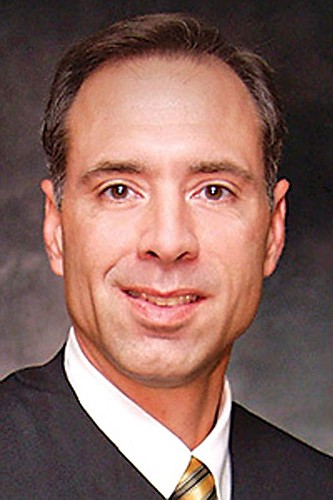
In making his first appointment to the Florida Supreme Court, Gov. Rick Scott on Friday selected a veteran appellate judge with conservative credentials.
Scott appointed C. Alan Lawson, chief judge of the Daytona Beach-based 5th District Court of Appeal, to replace Justice James E.C. Perry, who is leaving the state’s highest court because he has reached the mandatory retirement age.
Lawson, 55, will join the seven-member court Dec. 31.
In line with a conservative judicial philosophy, Scott said the primary question he asks potential judges is whether they understand the separation-of-powers doctrine for the three branches of government.
“My goal is, they interpret the law, they don’t create law,” said Scott, who is a lawyer.
Lawson, who has served as an appellate judge for a decade and before that as an Orange County circuit judge, apparently met that test.
“He’s not going to legislate from the bench,” Scott said.
Lawson, who is a 1987 graduate of the Florida State University Law School, said there are limits on a court’s interpretation of the law.
“The Supreme Court, and the courts, do determine whether a law is constitutional or not,” Lawson said. “From the very beginning, that right of the branch also came with a promise that it would be exercised with judicial restraint.”
However, Lawson declined to comment on cases where he believed the Supreme Court has overstepped that boundary, saying it would be unethical for him to talk about issues that could potentially return to the court.
His appointment to the Supreme Court reduces the influence of the liberal-leaning court majority, which has been made up of Perry, Chief Justice Jorge Labarga and justices Barbara Pariente, R. Fred Lewis and Peggy Quince.
Lawson is likely to bolster the conservative-leaning minority, which has been comprised of justices Charles Canady and Ricky Polston, who were both listed as references on Lawson’s application.
Lawson, who has lobbied the Legislature on behalf of court funding and other judicial issues, said he is friends with all of the justices, although he and Canady share a similar judicial approach.
“The way I approach statutory construction issues and constitutional issues matches closely with Justice Canady,” Lawson said.
His appointment might also foreshadow the court’s future, as Scott made it clear Friday he believes he has the right to appoint the next three Supreme Court justices, with the vacancies expected to occur on the day Scott leaves office in January 2019.
Those vacancies would involve the retirements of Pariente, Lewis and Quince.
“I will appoint three more justices on the morning I finish my term,” Scott said.
But the question of whether Scott or the next governor has the authority to make those appointments is unresolved.
And the resolution of that dispute will become more complicated depending on whether Scott, who is a Republican, is succeeded by another Republican or a Democrat.
State House Minority Leader Janet Cruz, D-Tampa, said Friday she was “deeply troubled by Gov. Scott’s assertion this morning that he intends to break with precedent and select three Supreme Court justices as he leaves office in 2019.”
She pointed to a 1998 agreement between then-Gov. Lawton Chiles, a Democrat, and incoming Gov. Jeb Bush, a Republican, to appoint Quince.
“The Supreme Court is no place for political gamesmanship,” Cruz said. “If Gov. Scott follows through on this assertion, he risks setting off a contentious legal battle with his successor that would mar the transition process and throw our state’s highest court into uncertainty.”
The appointment of a conservative justice to succeed Perry, who was part of the court’s liberal wing, was never in doubt.
The Supreme Court has a mandatory retirement age of 70, though some justices, such as Perry, 72, are able to stay somewhat longer to finish terms.
Scott picked Lawson over Wendy Berger, another judge on the 5th District Court of Appeal, and Daniel Gerber, an Orlando attorney, both of whom had conservative credentials.
The three candidates had been forwarded to Scott by the Supreme Court Judicial Nominating Commission, which interviewed 11 potential candidates last month.
Lawson’s appointment drew praise from some Florida legal leaders, with a strong endorsement from business groups and conservative legal advocates.
William J. Schifino Jr., president of The Florida Bar, said Scott had “three excellent candidates” to consider for the appointment.
“(Lawson) has demonstrated himself to be an excellent jurist and someone who has the best interests of all Floridians at heart,” Schifino said.
Tom Feeney, head of Associated Industries of Florida, a business lobbying group, said he looked forward to a court that is more deferential to the Legislature and executive branch.
“We are anxious for the day that a majority of the Florida Supreme Court can restore respect for the constitutional separation of powers, including legitimate powers of the popularly elected members of the legislative and executive branches,” said Feeney, a former state House speaker and congressman.
A Lakeland native, Lawson grew up in Tallahassee, attending Tallahassee Community College before he entered Clemson University, where he earned a bachelor’s degree. He returned to Tallahassee to attend law school and finished second in his graduating class at Florida State.
He spent eight years at the firm Steel Hector & Davis, where he became a partner.
He was an Orange County assistant county attorney when Bush appointed him as a circuit judge in the 9th Judicial Circuit, where he took office in 2002.
Bush appointed Lawson to the 5th District Court of Appeal in 2006.
Lawson, who lives in Winter Park, has been married to his wife, Julie Carlton Lawson, since 1987. They have two grown children.